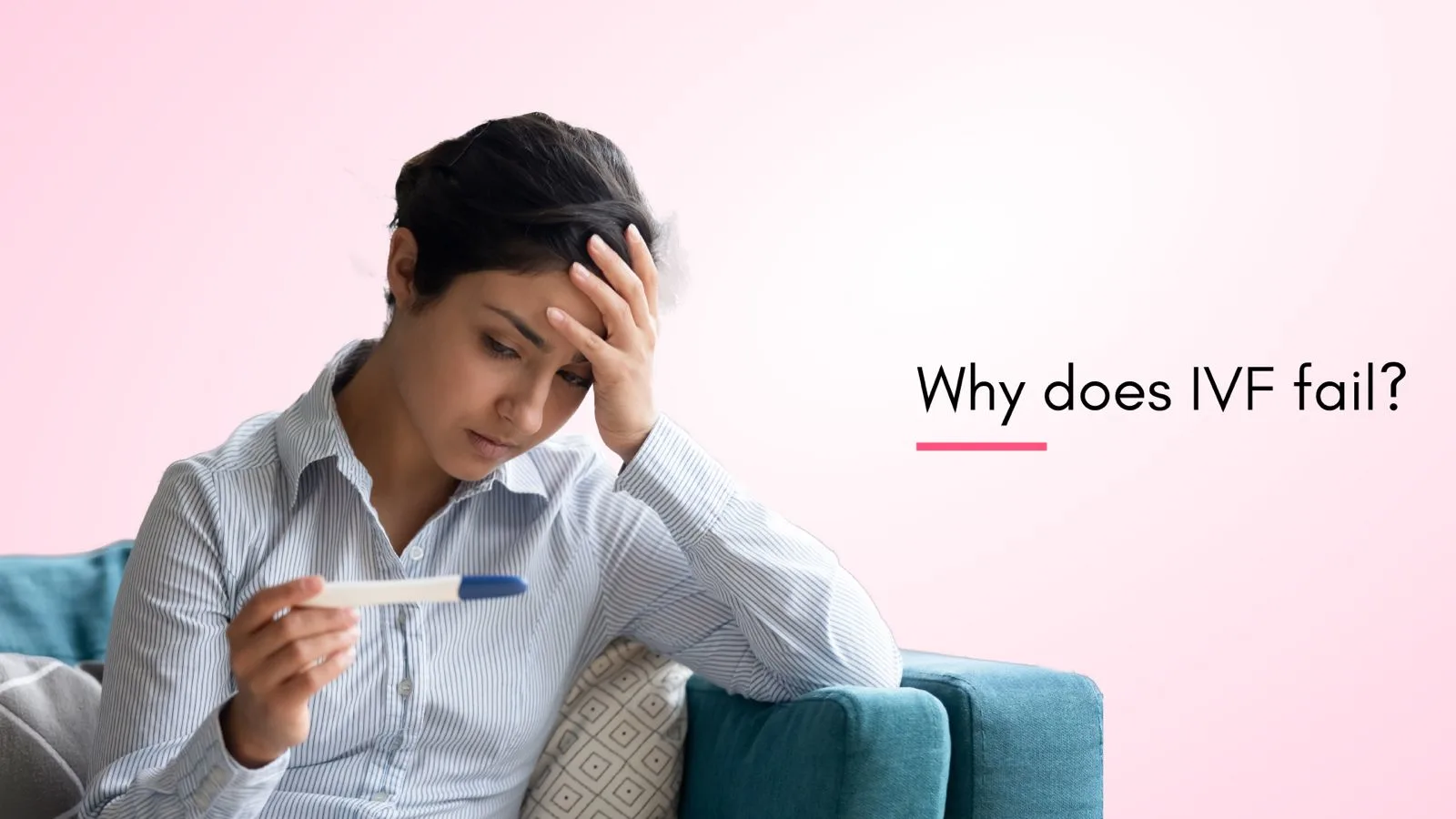Assisted reproductive technology has helped many couples to conceive. But did you know that it’s not a guaranteed success for all? With many causes of IVF failure, one might not be able to become a parent.
Despite its success rates, couples face issues. IVF failure reasons cannot be all known. These are influenced by several factors (sometimes influencing one another). Understanding the IVF’s unsuccessful reasons can help couples look for other possibilities.
The causes of IVF failure also help to improve the outcomes and manage expectations.
In this blog, we will go through the causes and symptoms of failed implantation of fertilized eggs.
Causes Of IVF Failure
There are various reasons for an IVF or implantation failure. One factor might influence the other.
Some of the factors influencing IVF failure are given below.
Related Read: Top Factors Affecting the IVF Success and Failure
Age Factor
One of the most common reasons why IVF fails is the age factor. Age plays an important role in the process’ success. As we know, women have a limited number of eggs.
As the woman ages, the quality and quantity of the eggs decrease, reducing the chance of successful fertilization and implantation. Many women want to pursue their careers or cannot find the right partner at the right age. Hence, the delay in parenthood causes IVF failure. It is recommended to get your eggs frozen if you’re planning parenthood later in life.
Quality of Eggs and Sperms
The quality of eggs and sperm also influences fertility. Many couples ask, ‘Why does IVF fail with good embryos?’- here’s the reason!
The poor quality of sperm and eggs results in failed fertilization. If not, the embryo can have abnormal development that further leads to miscarriages or implantation failures.
Let’s go through both in detail for a better understanding:
Quality of Eggs: The quality of eggs is primarily determined by a woman’s age. As she ages, the quality of her eggs decreases along with the quantity, which might also show abnormalities in the chromosomes.
Quality of sperm: Sperm quality is influenced by lifestyle choices, age, and underlying health issues. A poor-quality sperm can have low motility (the ability to swim) or abnormal shape. These hinder the ability to fertilize eggs and become one of the leading causes of IVF failure.
If the reason behind the quality depends on lifestyle changes and medical interventions, one can still get a healthy pregnancy. Doctors recommend following a balanced diet, avoiding alcohol and smoking, maintaining a healthy lifestyle, and minimizing exposure to toxins in the environment.
Embryo Quality
Embryo quality is also one of the factors why implantation fails. During the in-vitro fertilization, resulting embryos are kept and cultured inside the lab for a few days to months before the transfer.
An embryologist will check the embryo’s size, shape, and structure before the transfer. It might have chromosomal abnormalities and poor development. Getting a PGT or preimplantation genetic testing scan is always recommended to check for chromosomal abnormalities before the transfer.
Embryos are monitored on the 3rd and 5th days after fertilization, which are important growth stages. The period from day 3 to day 5 is critical for their development. Transferring an embryo on the 5th day is more successful than on the 3rd day. However, even with the best embryos, IVF can still fail. Research is ongoing because the process depends on natural selection.
Related Read: The Four Stages of Embryonic Development
Ovarian Response
One reason for IVF implantation failure is the varying ovarian response to fertility drugs. This variation affects the number and quality of eggs retrieved during the IVF cycle. Both inadequate and excessive responses to ovarian stimulation can impact success rates.
Both factors can affect the number and quality of eggs and, hence, the success of IVF.
Implantation issues
Implantation occurs when an embryo embeds itself into the lining of the uterus, allowing it to begin growing. When the embryo fails to attach to the uterine wall after IVF treatment, it is referred to as implantation failure. To check for successful implantation, your doctor will conduct ultrasound tests.
Endometrial Receptivity
The endometrium is the uterine lining. If the endometrium’s receptivity is weak, IVF will fail.
Factors like hormonal imbalances, thin endometrium, and uterine abnormalities influence the implantation rates. Make sure to get it checked before the procedure. Many patients wonder ‘why did IVF fail’ without getting a proper physical & medical examination.
PCOS Factor
Women with PCOS may face challenges during IVF. This is due to hormonal imbalances, egg quality issues, and lower implantation rates.
Uterine abnormalities
The uterus might have abnormalities that become one of the causes of IVF failure. These include polyps, septum, or fibroids. You can get diagnosed before starting with the IVF procedure.
Genetic issues
Causes of implantation failure in IVF are also influenced by genetics. It can be in either partner that affects embryo quality, implantation, and pregnancy outcomes.
Stress and emotional factors
Stress and emotional factors are the reason why IVF fails the first time. Couples might become conscious and worried, influencing hormonal levels and uterine receptivity.
Do not take stress, and make sure you’re ready to face the consequences of the procedure. Talk it through with your partner and doctor.
Related Read: The Role of Stress in Fertility and IVF Outcomes
Medication-related issues
Some couples face medicinal issues due to poor clinic facilities or self-negligence. It includes improper dosages or timings leading to causes of IVF failures.
Take your medicines on time and according to the prescription. Do not mix other medications or alternatives with the given drugs.
Conclusion
IVF is a ray of hope for many couples. However, it is important to understand the causes of IVF failure and how these factors interact. You cannot know the root cause, but a good team of medical experts can improve the chances of success.
So what happens if implantation fails? A new hope is always waiting. Address the factors with proper diagnosis, get personalized treatment plans and emotional support, and you’ll be good to go.




























